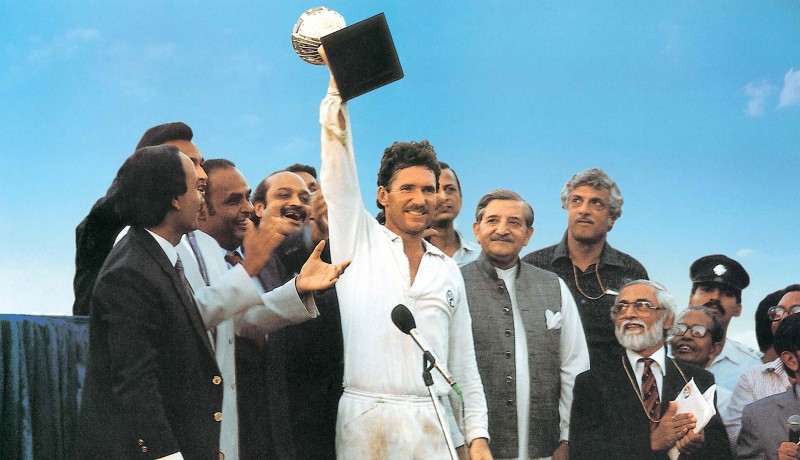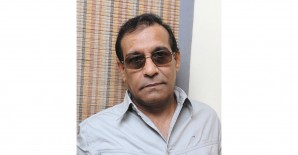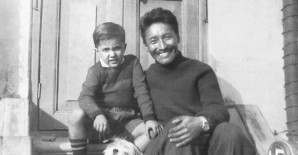
Columns

Raju Mukherji looks back at the contribution of late industrialist Dhirubhai Ambani to Indian cricket
To begin my innings with Harmony-Celebrate Age, instead of a sizzling ‘sixer’, I reckon a classical cover drive would be the ideal start. Let my bat drive home an issue that has never been highlighted by our cricket writers and sports scholars.
In India, we have a tendency to criticise our politicians and industrialists for everything that is wrong in Indian sport. But how many of us are aware that one of India’s finest hours in sport was made possible by a trio that comprised a politician, an industrialist and a lawyer-politician?
Dhirubhai Ambani was posthumously honoured by the Government of India with the coveted Padma Vibhushan for his unparalleled contribution to the Indian industrial environment. That said, the sheer magnitude of his achievement in the industrial sector has dwarfed many of his other works in the interest of Indian society. One of his magnificent achievements was in the arena of cricket. Sadly, the issue has never been highlighted in our country. His yeoman contribution to cricket has never been acknowledged and recognised.
Dhirubhai Ambani gave cricket in India a new and novel dimension. He exemplified the spirit of patriotism in no uncertain manner on a monsoon morn in Mumbai way back in 1983. He picked up the phone receiver and gave his assent as the voice from the Prime Minister’s Office informed him to meet her within a couple of days. The visionary industrialist did not have a single query. Nor did he want to know the reason for the urgency. Dhirubhai wasted no time.
The next day, he was at Mrs Indira Gandhi’s chamber at 10 Janpath in New Delhi to keep his appointment as desired by the prime minister herself. N K P Salve, the president of the Board of Control for Cricket in India (BCCI), was also asked by the PMO to be present in the room at the appointed hour. Salve happened to be a cabinet minister at the time and was very highly rated for his integrity as a lawyer as well as a politician.
Mrs Gandhi kept the usual pleasantries short, as was her style, and went straight into the principal issue. She asked Dhirubhai whether the latter would be keen to sponsor a world cricket championship on Indian soil. Dhirubhai Ambani, God bless him, did not hesitate for a moment. Instantly, he realised the image and prestige of his nation was at stake. He nodded and uttered, “Madam, yes, I would be too happy to give a blank cheque to cover the entire cost of the tournament since it is for a national cause.” He did not betray any emotion. He asked no questions. He sought no clarifications. The grand visionary immediately grasped that the money was to be spent to uphold India’s honour. For him that was enough reason. He offered a blank cheque. Yes, that was Dhirubhai Ambani.
But we are going ahead of the actual story. The story begins at Lord’s. 25 June 1983 to be precise. India had reached the Prudential World Cup final against all odds. ‘Kapil’s Devils’ were to play the defending champions, the rampaging West Indies, at Lord’s. A few days prior to the final, just after India had defeated the hosts England in the semi-final, N K P Salve requested the authorities at Lord’s for two tickets for the final. The tickets were requested for Siddhartha Shankar Ray and his wife Maya. S S Ray, a former Calcutta University Cricket Blue, was the Indian High Commissioner to the US at the time.
Surprisingly, the authorities at Lord’s turned down the request of the BCCI president. Even priced tickets were not made available. For Salve, the epitome of gentlemanliness, this was an embarrassing scenario. The president of one of the finalist teams could not offer even two tickets to an Indian ambassador. Salve, a man of high integrity and self-respect, decided there and then that he would not take this insult to his country lying down.
When India won the coveted trophy, Salve lost no time and brought the winning team over to New Delhi from Heathrow to meet the prime minister. After the reception was over, he made a beeline for Mrs Gandhi and told her of the humiliation he had to face in London over those two tickets. She asked him what he had contemplated to avenge the insult. Salve, the outstanding lawyer and clever politician, had a mind of his own. He devised that he would try to get the World Cup out of the clutches of England, who had monopolised hosting the quadrennial tournament since 1975.
Within the course of the next few months, the BCCI was preparing itself to take on the challenges of the major cricketing powers of the time, England and Australia. It was decided that at the next meeting of the ICC, where the dates of the following World Cup in England would be determined, the BCCI would offer double the guarantee money to all the participating teams. On the day of the meeting at Lord’s, true to form, the plan was executed to perfection.
At the ICC meeting held at Lord’s to confirm England as host, the eloquence of Salve had the influential lobbies scurrying for cover. In a magnanimous gesture, the BCCI president doubled the guarantee money if the tournament were held in India and, then, for good measure, made some more concessions for the benefit of the players and their families. All reservations about playing the World Cup on Indian soil evaporated into thin air in next to no time.
The ultimate decision of the meeting heralded that the 1987 edition of the World Cup would be held in India. In another masterstroke of diplomacy, the statesman in N K P Salve asked Pakistan to be a co-host. The 1987 Cricket World Cup was the first to vanquish the monopoly of England as the permanent venue. Since then, the championship keeps moving around the globe by rotation, as it should be in a democratic scenario.
The spirit displayed by Dhirubhai Ambani, N K P Salve and Mrs Gandhi has been forgotten in this land of ours. They showed how politicians, professionals and industrialists can help to shape the world through the medium of sports.
Mrs Gandhi was assassinated in October 1984. The country was in turmoil. The World Cup was only of secondary importance. Obviously, there were far more important jobs awaiting attention.
But Salve remained resolute. He approached Dhirubhai to find out if he was still willing to sponsor the event. Salve’s apprehension can well be imagined. Indira Gandhi was no more. The nation was staring at crisis. But the industrialist from Mumbai said, “Nothing doing, the show must go on. I will not go back on my word.” As promised, the blank cheque from Dhirubhai Ambani remained with Salve.
Rajiv Gandhi took over from his late mother. Salve kept his unwavering focus. For his part, Dhirubhai, who had no interest in sports, sent his younger son Anil to get involved with the staging of the World Cup. In one grand gesture of magnanimity, Anil Ambani had all the cricket boards salivating—he offered complimentary hospitality to all the office bearers of the respective cricket boards. This served to add salt to England’s wound. People who had denied India just two tickets were granted full hospitality throughout the course of the championship! It was an exemplary Gandhian masterstroke.
Indeed, the trio—Salve, Ambani and Gandhi—was magnificent in handling the global event. The Reliance World Cup was an outstanding success in terms of media coverage, sponsorship and crowd participation. Just goes to show that with the right people in the right places, India can move the world. Dhirubhai Ambani deserves our salute for his superlative, patriotic gesture.
Kolkata-based Mukherji is a former cricket player, coach, selector, talent scout, match referee and writer
Featured in Harmony — Celebrate Age Magazine January 2018
you may also like to read
-
Mental workout
Mukul Sharma tells you how to keep those grey cells ticking Everyone will ultimately lose his or her brain….
-
Helpline
Dr Harshbir Rana answers your queries on personal and social issues related to ageing, elder care and intergenerational relationships ….
-
Off the cuff
Raju Mukherji pays tribute to his first hero, Tenzing Norgay, an exemplary mountaineer Darjeeling, 1955. Dr ‘Pahari’ Guha Mazumdar….
-
Yoga RX
Shameem Akthar shows ways to control debilitating ankle pain through regular practice Ankle pain is so common and prevalent….








